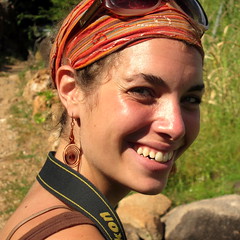In the film “Blood Diamond,” Leonardo DiCaprio’s character often grumbles a brusque “T.I.A.” — “This is Africa.” Machete-wielding vandals, a nightclub party turned bloodbath, corrupt money dealings — “T.I.A., T.I.A., T.I.A.” I, fortunately, have yet to utter the three letters in any comparable scenarios, but in ten days here, I’ve murmured the phrase more than a few times: while switching on my headlamp during one of the frequent power cuts, while crushing cockroaches under my shoe, while passing boys on the roadside hawking skewers of mice, while riding a jostling minibus as vendors reach their hands through the windows to sell tiny plastic bags filled with sugarcane juice. Last Friday, though, I muttered it more quizzically. “This is Africa?”
I had been invited to a blowout festival, celebrating not one, but two major holidays. I was promised performances, a multi-course meal, bottomless wine and beer, hundreds of guests. The party was being held at a restaurant just outside the city center.
Let me clarify: at a Chinese restaurant just outside the city center. These weren’t Malawian holidays being celebrated — the owners were feting the 60th anniversary of the establishment of the People’s Republic of China and the Mid-Autumn Moon Festival, the second biggest holiday after New Year’s. And that’s how, on my second day in Blantyre, I wound up feasting on moon cakes and pig ears (full disclosure: I avoided the latter, though I did take a nibble of the pork tongue) with what appeared to be Malawi’s entire Chinese population.
The party began with subdued karaoke, the lyrics spooling across video images of mountains and oceans. Guests performed songs about communism (including one called “Soldiers, Stand Up”) and popular pop tunes. My American friend Dave repped our homeland with a few Johnny Cash and John Denver ditties. I met Richard, a Taiwanese man who considers himself a second-generation Malawian — his parents came as missionaries decades ago and eventually turned to business investment. This has proven a common pattern among Chinese immigrants, and China is now the world’s number-one investor in Malawi.
As the evening wore on and the wine pitchers emptied, the karaoke performances grew sloppier. I earned a number of fans at my table, thanks to my adept chopstick skills and my willingness to sample the white wine made from maize, sticky rice, and sorghum (harsh and foul-tasting, with an odd pineapple aftertaste and an alcohol content of 42 percent). Our table was visited by countless revelers, all wanting to toast us. “Ganbei!” they hollered (literally “empty your cup” in Chinese).
Toward the end of the celebration, marveling at the gaudy red and gold décor and fanning away cigarette smoke, I got up to chat with the only Malawians in the room, two waiters dressed in crimson tunics.
“Hey, bambo, what do you think of all this?” I asked.
The first one, another Richard, cringed. “I don’t like the singing so much,” he said.
Davidson, the second waiter, was more direct. “This is boring,” he said. He went on to question the order of the courses (“why do they serve the soup last?”) and the peculiar food items (“the only things from Malawi are the fish and the soft drinks”). Then he had words for me. “I want you to be my friend. Can I have your phone number?”
Dave overhead this as he slipped out the door. “Just the first step to a marriage proposal,” he quipped.
Yep, this is Africa.
Subscribe to:
Post Comments (Atom)




No comments:
Post a Comment